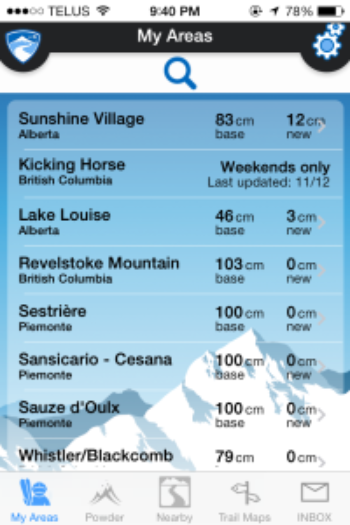These free apps will make trip planning faster and easier and the ability to look back at your trips with a plethora of data is fun! However, apps should not be relied upon entirely; you should always carry a copy of a map, trail description as well as a compass. Recently a lot of controversy has surrounded apps that claim to act as avalanche transceivers; the Canadian Avalanche Centre has warned against using these apps. In the end, when your life is at stake, carrying the proper equipment is well worth the price tag. The same advice can be extended to these app suggestions, in the right time and place they’re more convenient, but they should not be replacing appropriate reliable equipment. Not to mention, cold weather zaps electronics of battery power, potentially making app usage problematic in the winter. Tip: Keep your device on an inside pocket close to your body.
1. Weather Network
One of the first things you should do before heading out is check the weather! Often weather in the city is not what will be encountered in the mountains or wherever your adventure is planned for the day. I’d say 80% of the success of the trip depends on your planning, and taking into account what the weather will be is part of that. The Weather Network app has pretty reliable information for urban and rural centers as well as provincial and national parks. It offers a forecast right down to the hour, which should be taken with the grain of salt. For example, if their forecasting 30% chance of rain in the afternoon for the Kananaskis Park region, I would plan to take my rain gear! Even though the chance is small, Kananaskis Provincial Park covers a lot of area and mountains can be pretty unpredictable; one valley could be basking in sun while the other being drenched.
2. On The Snow Ski Report
This is a handy app to check in the winter when trying to decide where to go skiing or boarding or if you need a heads up on whether or not to play hooky from work on a powder day. It offers up to date snow reports for resorts around the world. You can select your favorite resorts to appear under My Areas for quick reference. The Powder Points tab offers a quick overview of resorts that have received powder in the last 24 hrs. My favorite thing about this app is you can set it up to send you automatic notifications if one of your favorite resorts receives a specified amount of new snow. I have mine set at 15cm, anything below that I have trouble getting excited about. The Nearby tab automatically lists all ski areas within a certain radius to your current location. It even has an option to download trail maps for the ski areas in your My Areas tab! You’ll never get lost again!
3. Avalanche Report
If you’re more into playing in the backcountry than at the resorts, checking the latest avalanche bulletin should be at the top of your list of trip planning. The Canadian Avalanche Centre does a fantastic job of updating and providing avalanche bulletins for multiple areas in British Columbia and Alberta. They even make it more accessible by having them all available on an app, no more excuses! If you’re new to the sport of backcountry skiing or snowboarding they have outlined all the essential gear you’ll need to take with you right in the app. Even more impressive is they’ve teamed up with Mountain Equipment Co-Op, offering easy links to shop for that essential gear online or at your nearest MEC store.
4. Topographic Maps
It’s always a good idea to have a topographic map and not just a trail description when out on a hike, snowshoe or ski. Topographic maps give tons of information like when to expect elevation changes and creek crossings. A paper copy is way more valuable than an electronic version, but one is better than none! My suggestion is to save it as a picture on your device beforehand, that way you’re not relying on GPS or data service. A cool thing about this app is that it allows you to measure distances, and therefore makes it easier to compare different routes.
5. Map My Hike
This is a handy tool to documenting your adventure. Ever wonder how far you really went? How fast you were hiking? How much elevation gain you conquered? This app will help document all of that. It uses your device’s GPS to track your activity (choose from a huge list including hiking to mountain biking) and records your workout details, including duration, distance, pace, speed, elevation, calories burned, and your route traveled. You can keep a log of all your adventures to track your training or share it with your friends via social media.
6. All Trails
This app is like a trail guide book in your phone! It uses your current location (or a specified one) to find nearby hiking trails. You can filter the search on type of activity (select from an extensive list that includes everything from hiking to fly fishing), rating, difficulty, whether it is open now, kid friendly and if dogs or horses are allowed. Once you complete a hike you can keep a log of them and share with your friends! Although not 100% of all hiking and scrambles are included in this app, it has an extensive library to get you started. If you find a trail that you notice isn’t on the app, write up a trail report and submit it!
7. MEC
Last but not least, if you are unsure about what equipment you need or what to look for, MEC is a great resource. Their staff are extremely knowledgeable from firsthand experience and their easy to navigate app will have you set up with the right gear in no time! Also it comes with a handy barcode scanner. That’s great for when you see something on your friend and want the same thing or if you get sucked into the MEC vortex and want to see what the damage is before you reach the till.

